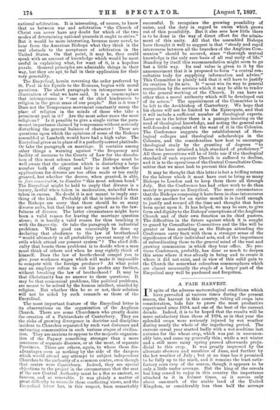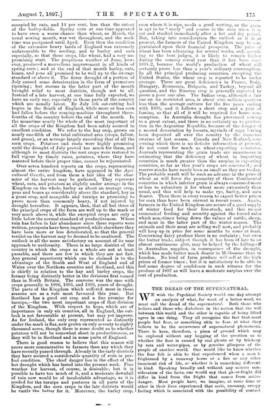A FAIR HARVEST.
IN spite of the adverse meteorological conditions which have prevailed at various times during the present season, the harvest in this country, taking all crops into consideration, bids fair to prove the most productive experienced since 1894, and one of the best of the current decade. Indeed, it is to be hoped that the results will be more satisfactory than those of 1894, as in that year the splendid crops were seriously injured by wet weather during nearly the whole of the ingathering period. The current cereal year started badly with a wet seedtime last autumn for the wheat crop, which was put in unseason- ably late, and came up generally thin ; while a wet winter and a still more rainy spring proved afterwards preju- dicial to this crop. It was greatly improved by the alternate showers and sunshine of June, and further by the hot weather of July ; but at no time has it promised to be fully up to the mark, and it remains the least satis- factory corn crop of the season, though it appears to be only a little under average. But the king of the cereals has long ceased to enjoy in this country the importance attached to it in former times, as it covers only about one-tenth of the arable land of the United Kingdom, or considerably less than half the acreage occupied by oats, and 14 per cent. less than the extent of the barley-fields. Spring corn at one time appeared to have even a worse chance than wheat, as March, the usual sowing month, was wet throughout, and the seed- time was postponed until April. Even then the condition of the extensive heavy lands of England was extremely unfavourable to the seeding, and to barley and oats especially, so that these crops, like wheat, had a very un- promising start. The propitious weather of June, how- ever, produced a marvellous improvement in all kinds of spring corn ; and at the end of that month barley, oats, beans, and peas all promised to be well up to the average standard or above it. The fierce drought of a portion of July caused some deterioration in the form of premature ripening ; but storms in the latter part of the month brought relief to most districts, though not to all. Instead of a late harvest, at one time fully expected, we have an early one, especially in those parts of the country which are usually latest. By July 5th oat-cutting had begun in the South of England, while more or less corn had fallen before the reaping-machine throughout three- fourths of the country before the end of the month. In the meantime nearly the whole of the most important of all the crops of the Kingdom had been safely secured in excellent condition. We refer to the hay crop, grown on nearly one-fifth of the total cultivated area (crops, fallow, and grass), or an acreage largely exceeding that of all the corn crops. Potatoes and roots were highly promising until the drought of July proved too much for them, and although in most districts the root crops were restored to full vigour by timely rains, potatoes, where they have matured before their proper time, cannot be rejuvenated.
Over seven hundred reports on the crops, representing almost the entire kingdom, have appeared in the Agri- cultural Gazette, and from them a fair idea of the char- acter of the harvest may be gathered. They represent wheat, oats, and potatoes as slightly under average in the Kingdom on the whole, barley as about an average crop, peas and beans as considerably above the standard, hay as a great crop, and mangolds and turnips as promising to prove more than commonly heavy, if not injured by drought hereafter. It appears, then, that all but three of the principal crops of the farm are well up to the mark or very much above it, while the excepted crops are only a little below the normal standard of productiveness. Where rain has fallen in fair abundance since these reports were written, prospects have been improved, while elsewhere they have been more or less deteriorated, so that the general verdict on the harvest may be deemed to be unaltered. The outlook is all the more satisfactory on account of its near approach to uniformity. There is no large district of the country in which the crops as a whole are not at least passable, and there are few in which they are not fair. Any general superiority which can be claimed is to the advantage of the South and West of England and of Wales over the Northern counties and Scotland, and this is chiefly in relation to the hay and barley crops, the former being distinctly better in the divisions first named than in North Britain. The converse was the case with crops generally in 1896, 1895, and 1893, years of drought. The parts of the Kingdom which suffered most in those seasons are as a rule most favoured this year. But Scotland has a good oat crop and a fine promise for turnips,—the two most important crops of that division of the Kingdom. With respect to hops, which are of importance in only six counties, all in England, the out- look is not favourable at present, but may yet improve. As for Ireland, the only crop represented as distinctly under the mark is flax, now grown on only seventy to eighty thousand acres, though there is some doubt as to whether potatoes will not be somewhat short in productiveness, as they will be in Scotland and in some parts of England.
There is good reason to believe that this season will Drove more remunerative to farmers than any which they have recently passed through. Already in the early districts they have secured a considerable quantity of corn in per- fect condition. The chief danger lies in the effect of the hot drought which has lasted into the present week. Fine weather for harvest, of course, is desirable; but it is possible to have too much of it, and a moderate downfall of rain now would be of incalculable advantage, as it is needed for the turnips and pastures in all parts of the Kingdom, and the corn crops in the late districts would be vastly the better for it. Moreover, the barley crop, even where it is ripe, needs a good wetting, as the grain is apt to be " steely " and coarse in the skin when it is cut and stacked immediately after a hot and dry period. But, taking into consideration the outlook as it is at present, the farmers of the United Kingdom may be con- gratulated upon their financial prospects. The price of wheat has been advancing for several weeks, and, accord- ing to the best judges, it is likely to remain hi;,lier during the coming cereal year than it has been since 1891-2, because the world's production of wheat will certainly prove less than a year's ordinary consumption. In all the principal producing countries, excepting the United States, the wheat crop is reported to be under average. There are great deficiencies in France, Italy, Hungary, Roumania, Bulgaria, and Turkey, beyond all question, and the Russian crop is generally expected to prove a poor one also. The Indian crop, although a fair one on its restricted area, is about nine million quarters less than the average outturn for the five years ending with 1895, and it follows a short crop and a year of famine, so that all of it will be required for home con- sumption. In Australia drought has prevented sowing to a great extent, and there is no certainty as to produc- tion in the Argentine Republic, because of the danger of a second devastation by locusts, myriads of eggs having been deposited all over the country by the immense swarms of last season. Canada and New Zealand, con- cerning which there is no definite information at present, do not count for much as wheat-exporting countries. Journals representing the grain trade are unanimous in estimating that the deficiency of wheat in importing countries is much greater than the surplus in exporting countries, so far as this year's crops are concerned ; and reserve stocks have rarely been as small as they are to-day. The probable result will be such an advance in the price of wheat as will force the peasantry of those Continental countries in which inferior grain is always consumed more or less to substitute it for wheat more extensively than usual, and this will help to make rye, barley, and oats dearer. Thus there is every reason, to expect better prices for corn than have been current in recent years. Again, farmers in the United Kingdom are secure of a good supply of winter food for their live-stock, and this, means economical feeding and security against the forced sales which sometimes bring down the values of cattle, sheep, and meat in the latter part of the winter season. The animals and their meat are selling well now, and probably will keep up in price for some months to come at least. Concerning dairy produce there is no certainty ; but even the butter trade, subject though it has been of late to an almost continuous glut, may be helped by the falling-off in Australian supplies, in consequence of the drought, which has made butter much dearer in Melbourne than in London. No kind of farm produce will sell at the high prices of former times ; but it is satisfactory to be able to feel some degree of confidence in such returns for the produce of 1897 as will leave a moderate surplus over the cost of production.



































 Previous page
Previous page